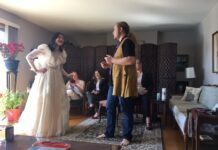Newspapers, social media, tv and radio, all ways of informing people, broadcasting news and information, are essential to any healthy society, and are at the very core of democratic systems. It is really significant, therefore, that more than 1,500 journalists have been murdered around the world since 1993, 55 of them in 2021 alone, according to statistics by UNESCO, the United Nations Educational, Scientific and Cultural Organization.
We can be grateful that this phenomenon is not present in Canada as it is in other countries, where the free flow of ideas, information, and criticism of governments and elites is seen as a dangerous form of sedition by autocrats and powerful people. But, although that level of violence is not as common in North America, or western Europe, there is still a genuine threat to press freedom through other means.
We have all become familiar with terms like “fake news” over the past few years, and the undermining of media credibility has been ongoing, as conspiracy theorists, right and left wing organisations, as well as some political figures, have taken a new direction in disarming criticism of their policies and activities. Journalists may not be murdered here, but their reputation and credibility, their believeability, is being destroyed, bit by bit.
In 1993, the United Nations General Assembly declared May 3 World Press Freedom Day, on the recommendation of the UNESCO. May 3 carries a special significance, as it is also the anniversary of the Declaration of Windhoek, a statement of free press principles created by newspaper journalists in Africa during a UNESCO seminar in Windhoek, Namibia in 1991. The Declaration calls for free, independent, pluralistic media worldwide, and characterizes free press as essential to democracy and a fundamental human right.
To attack a free and open media is, therefore, an attack on all our rights and freedoms, as it attempts to prevent us from knowing the truth, facts, information which we need in order to make informed decisions, especially at the ballot box. We have seen recently what the effects of such attacks on transparency and attempts to control information have had in Russia, following its invasion of Ukraine. Putin and minions refer to the war as a “special military operation”, and have denied the Russian people access to accurate and complete reporting on what is actually being inflicted on Ukrainian towns and its people by the Russian military. This disarms most opposition to the war at home, and encourages a patriotic, nationalist surge of support for a war the Russian people might otherwise condemn.
It is easy to see this on an international scale, but it also happens here at home in more low-key and subversive ways. Not to bring up the proposed prison again (sorry), but the fact that Freedom of Information requests to the Ford government for the background papers showing how Kemptville was chosen for the prison, and what was involved in making that decision, have been met with hugely redacted releases of documents which conceal everything that is relevant and useful to residents. This is an attack on our collective civil rights, and needs to be seen as such.
I can remember, all too clearly, when I attempted to ask about why a previous mayor of North Grenville was turning off the microphones of those criticising him in public Council meetings, my mic was also turned off. When I demanded an explanation, I was removed by the police from the meeting, illegally, as the officer involved admitted to me. The only weekly newspaper at the time refused to even report that it had happened. The video of the meeting was edited to remove that part. I would hope such a thing would never happen again in our community, but who can be sure? The point is that we need a strong, independent media at all times, willing to speak truth to power, open to publishing all opinions, no matter how opposed to their own. Opinion is the lifeblood of democracy, freely expressed and open to rebuttal and criticism where necessary. No one side on any issue should be allowed to be silenced by another by denying them room to speak.
At the Times, this has been our policy from the beginning. Everyone has a voice. It is up to us to make use of this freedom and make our voices heard, even in argument and debate. As we head into two important elections this year, let’s keep that in mind. Don’t ignore your privilege in an open society. Don’t let others win the argument by default.
May 3 is World Press Freedom Day. This should always be seen by all of us as a celebration of our freedom also. When politicians, governments, or commercial interests try to keep things quiet, when there are attempts to silence or control a free media, then all our rights are in danger. If such social control of the dissemination of information succeeds, then we will not have a healthy and free society. All we’ll have is the sound of silence.






I am the ex mayor you are referring to. Public were invited to ask questions at the end of each meeting some people did and often good ideas came forward. During my seven years as mayor I turned the public mike off once and only once. I turned the mike off as you seemed only interested in criticizing staff and council. You were rude, and your comments were not supported by fact. A mayor is responsible for the conduct of his or her meeting and I was not about to let you to continue to insult council and staff. The OPP asked you to leave he did not “remove” you.